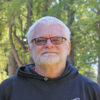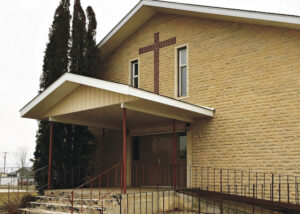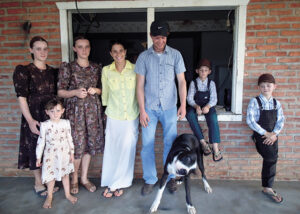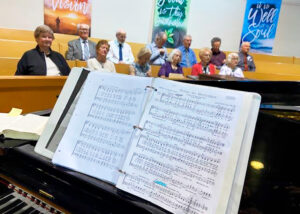Since Will Braun’s strong editorial in the December 1, 2023, issue (“What kind of peace church are we?”), the pages of Canadian Mennonite have included some passionate responses.
This is a good thing. Perhaps I’ll add one more.
I begin with a story.
When I volunteered with Circles of Support and Accountability (CoSA), I belonged to a group of five core members (offenders) and eight or ten volunteer supporters.
I remember one specific meeting when the air was filled with intense conversation mixed with loud laughter and teasing. We had a visitor that evening from the national CoSA organization. When we invited him to address the group, he said, “I simply can’t tell who’s a core member and who’s a volunteer.”
We considered that the warmest affirmation we could receive. To this observer, we were as one.
Experiences such as this lead my thinking as I consider what it means to be a peace church.
When we hear strong calls to denounce violence, be it perpetrated by Hamas or Israel, that’s okay, I guess.
My less-than-enthusiastic response to such denouncement is based on a rediscovered passion for the great commandment to centre my spirituality: Love God, neighbour and self.
Increasingly, I sense that our calls to denounce violence in large-scale situations align closely to the calls made by left-wing political voices.
I am seldom offended by left-wing political voices, but as a peace church, we are called to give our first and best energy to love—to love our neighbour, and, to sharpen the edge, to love our enemy.
If that same first and best energy is given to denouncing, there will be diminished creativity left for love. Our best passion will have burned up.
Returning to the CoSA example: When I sit with offenders, most of whom have sexual violence in their story, continually denouncing that violence has no value. Rather, support entails love, appreciation, affirmation and the building of a relationship wherein hard subjects can be broached.
You may argue that Hamas and Israeli forces haven’t shown that much interest in sitting down for a conversation over tea. I get that.
But how can our approach be adjusted to lead with something more hopeful than denouncement? How can we lead with love of God, neighbour and self?
I note comments that criticize our government for being slow to go on record against the violence. I suspect that this is connected to the incredible complexity of the conflict between Israel and Palestine.
How can we as a peace church be heard as a peace church?
I think I’ve previously mentioned my desire to have the word “yes” tattooed on my arm. It hasn’t happened yet, though the idea remains there in my mind.
So, I study that naked spot on my arm and challenge myself.
What does “yes” mean when people are dying in Gaza, in Ukraine, in Russia—in so many places within this creation?
What does “yes” mean when I consider the inquest into the killings of 11 people in two communities in Saskatchewan on September 4, 2022?
What does “yes” mean when I see the angry face of Benjamin Netanyahu on my screen? What does “yes” mean when I glimpse Vladimir Putin’s stolid visage?
I need some creative energy; my energy to denounce has run its course.
This is my last column for Canadian Mennonite. There is a desire to explore new places, hear new voices, create new conversations.
I’m grateful for the opportunity I’ve had to express my rants and share a few visions of “yes.”
I’ve enjoyed meeting many of you on my screen as you’ve offered both affirmation and challenge. I’ve been shown glimpses of spirituality as lived across our readership, and I am honoured.
Thank you, Canadian Mennonite. Thank you, readers.
Ed Olfert lives in Laird, Saskatchewan, and can be reached at p2peho@gmail.com.








Leave a Reply
You must be logged in to post a comment.